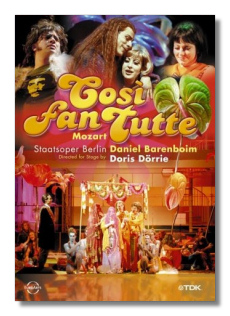
The Internet's Premier Classical Music Source
Related Links
- Mozart Reviews
- Latest Reviews
- More Reviews
-
By Composer
-
Collections
DVD & Blu-ray
Books
Concert Reviews
Articles/Interviews
Software
Audio
Search Amazon
Recommended Links
Site News
 DVD Review
DVD Review
Wolfgang Mozart

Così fan tutte
- Dorothea Röschmann (Fiordiligi)
- Katharina Kammerloher (Dorabella)
- Hanno Müller-Brachmann (Guglielmo)
- Werner Güra (Ferrando)
- Daniela Bruera (Despina)
- Roman Trekel (Don Alfonso)
Choir of the German State Opera, Berlin
Staatskapelle Dresden/Daniel Barenboim
TDK DVUS-OPCFT Mediaactive 205223-9 Widescreen, Dolby, DTS 2DVDs: 179min
German film director Doris Dörrie is the guiding force behind this production of Così fan tutte, which she calls "a hippie musical." The result is both a candy-colored look back at the 1970s, and an entertaining validation of Mozart's universality. When the material is as good as this, Twiggy-style hairdos and Che Guevara t-shirts are hardly serious distractions.
If you're a traditionalist, you'll probably despise this production. The Ferrarese sisters live in a modern condo with all the conveniences. The men (not soldiers but businessmen, apparently) test their women's fidelity dressed as flower children, not as "Albanians." The chorus arrives in Act Two for a "happening," including pot and meditation. The wedding is a traditional one – traditional Hindu, that is. At the end, the original couples are restored, but it is clear that no one is very happy about the situation, except for Don Alfonso and Despina, who are all over each other with lust. It is the last point – this unhappy ending – which contradicts Mozart the most. The message that all can be forgiven and that love and understanding can put everything right again is shattered by Dörrie's bitter direction.
While Mozart might not have recognized this Così, it's hugely entertaining nonetheless. More importantly, its musical values are strong. Best of all is soprano Dorothea Röschmann, who gets the biggest cheers of the evening for "Come scoglio" and "Per pieta." Röschmann's imposing yet sensitive vocalism and sheer stamina are a triumph. Bruera is adorable in "Una donna a quindici anni," and Kammerloher is charming in "È Amore un ladroncello." Among the men, tenor Werner Güra is a standout, even if he has to sing most of "Un' aura amorosa" lying on his back on a beach chair! Müller-Brachmann and Trekel are not well-differentiated, vocally; this Don Alfonso is hardly "an elderly philosopher." Still, both give strong performances too. All six of the singers are excellent actors too, and they cope well with Dörrie's stage business, which ranges from the lubricious to the ridiculous. Barenboim, a veteran Mozartean, keeps Dörrie's fantasies in check with a reading that defines integrity.
This production was filmed in front of an audience on September 1, 2002 at the Deutsche Staatsoper. The visuals (widescreen formatted) are excellent, as is the sound. Each act is on a separate disc. There is no bonus material, but one can choose subtitles in several languages (including English, of course), or to avoid them entirely.
Everyone should see a more traditional Così, but there's something about the story's cracked morality that attracts outlying interpretations such as Dörrie's and that of Peter Sellars, which I'd also welcome to DVD. Both productions prove that Mozart's most delicious opera is also his most disturbing.
Copyright © 2004, Raymond Tuttle


















